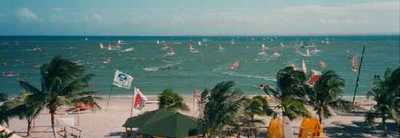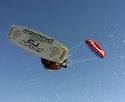
Update: pictures are up!
I spent the last week and a half on vacation on the island of Margarita, off the coast of Venezuela. We went for a wedding – the bride grew up there – and stayed to windsurf at El Yaque, a beach that’s famous for windsurfing and kitesurfing.
It was a great trip. We drank and ate too much, we barely remembered our high school Spanish, our keys got stolen, we drank the water and got the runs, we wore sunscreen and got sunburned, our windsurfing rigs tore up our hands and feet, we barely escaped Chavez and his armed thugs, we sat through eight hour layovers…and still, we had a blast.
I’m not going to do a full trip writeup, but I will post some things I noticed as we wandered around the island and talked to people. This was my first trip to South America, so some of these are probably common to many Latin countries. Also, Chavez and the political instability are a big enough topic that I’ll devote another post to them alone.
- People often wrapped their checked baggage in saran wrap to discourage theft. There were booths at the airport that offered to do this for a nominal fee.

- People were generally very outgoing, forward, and physical. There wasn’t much concern for physical space or other minor etiquette matters.
-
I didn’t notice a lot of overt machismo among the men. I did notice lots of its latent effects among the women, though. They tended to try to be traditionally feminine, at least physically: long hair, thin waistlines, heavy makeup, etc. Strikingly, the locals said that the majority of women have breast implants, usually paid for by Venezuela’s public health care!
-
Very few people spoke English, and we didn’t see many signs that included translations in any language other than Spanish. English is much more frequent in other developed countries, so the lack of it in Venezuela was interesting.
-
Most people immediately assumed I spoke Spanish. Happily, I do, but I was always surprised whenever anyone struck up a conversation. The accent is pretty standard – not Mexican, not Castillian – but they tend to drop the letter s at the end of words.
- Venezuela is near the equator, so naturally, the climate is very tropical, warm and humid. The soil was dark orange and mostly clay. Oddly, we also saw a lot of cacti (!) near the beaches.
-
The landscape on Margarita felt mostly rural, kind of country getaway, with a sprinkling of third world. Margarita is a popular vacation spot for upper class Venezuelans, so that made sense.
- The Venezuelan bolívar is pegged to the dollar at 2150:1, but inflation is roughly 16%, so the real (black market) exchange rate is around 5800:1. We changed most of our money at convenience stores, which gave us rates of 5000:1 to 5500:1.
-
On our first day at El Yaque, we met a couple other guys from California who were kitesurfing. Coincidentally, one works at Google, in Mountain View. The other owns a kite surfing shop in San Diego, Calikites. They’d taken three weeks of vacation, bought tickets to Caracas, and winged it from there.
-
The crowd in El Yaque was very European, as were the business owners. We met lots of Germans, French, Italians, and Brits, as well as a few Swedes, Swiss, Australians, and Belgians. Oddly, though, we didn’t see anyone from Asia, South Asia, or Russia.

-
In the last few years, El Yaque has become very popular with the spring break crowd. The beach can get so packed that you have to walk down into the water to get anywhere! Thank god we were there during the off season.
-
Many of the international people were on extended vacations, some for months at a time. We got a strong feel for the beach bum lifestyle: ride during the day, party at night, get up and do it again. Many people just flew somewhere, hung out and surfed for a few weeks, then headed to the next place that was supposed to have good wind. Not so bad, all things considered!




nice write-up Ryan. I’ll be looking forward to seeing you a double front loop when you’re back windsurfing at Shoreline!
w00t!
http://news.yahoo.com/s/ap/20071203/ap_on_re_la_am_ca/venezuela_constitution
Although, I’m highly suspicious that he lost by only 2 points.
It’s not necessarily a good thing that the reforms did not pass. Sure, there is a lot of corruption in VZ, but the reason the poor like him is because he is doing a decent job of redistrubiting wealth from the rich to the poor. Also, the economic growth has been outpacing not only it’s South American peers but also most of the world by a long shot the last few years.
I’m going to go to China now and chill with my communist comrades.
political debate, w00t!
“economic growth” is a funny way to describe the money they’ve made from the high price of oil. venezuela’s “break-even” oil price, ie where their oil exports and gov’t spending break even, is well over $80, as opposed to $40-50 for most OPEC members. that’s awful fiscal policy. hence all the venezuelans there who told us that he was living on borrowed time and instituting a bunch of feel-good programs that couldn’t last. more than one person there literally described it as buying votes.
even if we give him the benefit of the doubt on the economy, he tried to get rid of term limits and legalize his continued censorship of the media! that’s pretty despicable in my book. not to mention the violence his armed thugs, the circulo bolivariano, have been responsible for… :(
Not much reporting yet. I think that so far a lot of people don’t seem to be very concerned. The only information I could tell that might explain the difference between the pre-election poll and the post-election results was the very low turn out. Only something like 44% turned out. In this election, a lot of the people in the polls who were against the referendum turned out to be in Chavez’s political party. Rather than bothering to get off their ends and go and vote, unmotivated, they just stayed at home. If that is indeed an explanation, ironically them doing that might well have led to a legitimate victory.
Of course, I haven’t seen any real data so pants to it all. Without international observers it will be very hard. The absence of these observers, if that’s the case, is rather suspicious, of course, and certainly puts doubts on any result, particularly one that looked more beneficial to the government.
Anyway, the election was not close enough to steal. Chavez knew that if he tried anything there would be violence. As for him trying again, I doubt that he will get much traction there. His failure to win the election was very high profile, very Internationally visible, and invigorating for his opponents. Apparently, he did an end run of his own supporters on this one, and he thinks he will be able to do it again, this time working more closely with them, but I think they are now too spooked. Of course, he has more than 4 years to go, so who knows.
Besides, Chavez is a boob and doesn’t know how to steal an election. He couldn’t even pull off a coup d’etat, and even Charles Taylor couldn’t bungle one of those. Now, Valdamir Putin! There’s a guy who knows how to steal an election. You want to see some old fashioned election stealing, you go with the pros.
http://krotty.livejournal.com/36604.html
THAT is how you steal an election in STYLE!
As for Mr. Carter above, I assure you by your own standards, it’s a very very fine thing that the reforms didn’t pass. Ask yourself by which measure are you intending to measure the rightness and wrongness of those reforms.
If you really want to look at the situation from the left point of view, you can’t just pick out some flashy charity stunts and decide that the person responsible is conducting good Socialist policy. No economic policy will work without a broader view. It’s true that Ryans argument about this alleged bankrupting of the country doesn’t hold a lot of weight, because since most of the economic redistribution seems to be populist in nature, they can (in theory only) be seen as one time government outlays intended to jumpstart the country down the road to workers paradise. Fair enough. But what is he doing in the long run that will sustain the upward mobility of the peasantry? Agrarian reform? The ideals of the left are to liberate the spirit of mankind from the limitations of material necessity. How will the peasantry be liberated with the transfer of a limited commodity to enough hands which as individuals will barely by able to sustain themselves? A commodity which will dwindle over the years as the land is divided through the generations only to inevitably be sold back to those who they originally took it from for a pittance. Might as well just roll it in to another one-time wealth transfer. No matter, he failed at land reform anyway.
If the intent was to throw a national party for the poor, I would say he had succeeded in that, but this doesn’t leave very much for them in the long run. If indeed he is going to create a Socialist state, where are the Socialist reforms? What has he done to democratize the Unions and give them an independent seat at the table? Instead of figuring out how to make the courts more independent of business, he simply made them more tightly controlled by the government. Instead of creating a broad coalition of diverse parties, he’s consolidated them all in to his own.
Ultimately, the power that Chavez now assigns to himself, he assigns to his successor, who comes along when he dies or loses an election. His popularity is dropping, his own supporters were not given what they were promised, and instead got asked to hand over more power. What will happen when they finally turn on him? If the left fragments over this, which is likely, odds are that someone else will seize power, and years of political progress against will have been lost.
Of course, Chavez has been over demonized in the US. They all act like he is the return of Atilla the Hun. Most of the governments forget that he has won many-a-fair-election, which at least in the past had always been validated by independent observers as statistically correct. His opposition are themselves a repugnant collection of the usual interests with as little regard for democracy as they have for Chavez. The US is constantly intervening to undermine the political process. Some of his reforms are indeed good and wholesome. A number of important indicators have more or less improved since the reforms began.
Ultimately, though, most of what he did really sounds like “at least he made the trains run on time” – an expression widely used to point out the absurdity of populist gestures in the face of larger wrongs.
However, the pattern is unmistakable. He has for many years been creeping toward autocracy. In the last couple of years, it has accelerated markedly, culminating in this referendum. This will end bad, and as usual, it will be the poorest who will be the most vulnerable.
Pingback: Ryan Barrett